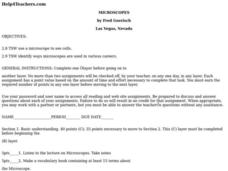Learning Games Lab
How to Use Oil Immersion Microscope
Teach the class how to use a microscope to identify bacteria in food. Scholars explore the different parts of the microscope and learn how to determine total magnification. They walk step-by-step through the procedure of preparing slides...
Curated OER
Microscope Mania
Young scholars examine parts of a microscope and how to use a microscope at five lab stations. They identify parts of a microscope by describing the differences between low power and high power. They visit Internet sites (included in the...
Curated OER
The Microscope and Cell
In this science worksheet, young scholars calculate the size of different samples using the microscope as part of a formal lab assignment.
Cornell University
Building a Compound Light Microscope
What better way to learn how to use a microscope than building your own? A lab investigation has scholars use lenses from magnifying glasses and sheets of cork to design their own compound microscopes. They calculate focal length and the...
LABScI
Cell Diffusion and Permeability: The See-Thru Egg Lab
Create a model to study a microscopic phenomenon. The seventh of 12 lessons uses an egg (without its shell) to represent a cell membrane. Using different solutions, learners explore the concept of cell diffusion. They monitor...
Baylor College
Tools of Magnification
Life science learners need to be able to use a microscope. With this comprehensive resource, they first experience how lenses and magnification work, and then get familiar with using a compound microscope. Tremendous background...
Normal Community High School
Golf Ball Lab
The first golf balls were made of wood and would only last for a few games. Modern golf balls last a lot longer but they don't float. The presentation provides the directions for a lab to determine the minimum amount of salt needed to...
Cornell University
Optical Simulation of a Transmission Electron Microscope
Don't have an electron microscope? Have your classes build the next best thing! A hands-on instructional activity asks scholars to build a model of Transmission Electron Microscope (TEM). They then use their models to identify the...
Curated OER
Microscopy
In this microscope worksheet, learners complete 15 review questions of labeling, defining and short answer after finishing a compound microscope lab. Lab included.
Curated OER
Using Microscopes In The Classroom
Get up close and personal with parts of a microscope lesson plans and activities for elementary students!
Curated OER
The Virtual Electron Microscope
Students explore the world of the very small using a Flash plug-in Virtual Electron Microscope. They complete and discuss an activity in which unknown samples are placed under the computer simulated microscope to determine where the...
Science 4 Inquiry
Plant Structures Lab Stations
In China, hibiscus is known as the shoe flower because it is used to polish shoes, while in Hawaii, it is honored as the state flower. Young scientists learn about the structure and function of flowers. They dissect hibiscus flowers,...
Curated OER
A Microscopically Enormous Look at Genetic Inheritance
Young scholars use microscopes to examine fly families and analyze their genetic inheritance. In this genes lesson plan, students also use the chi square for comparing genes and compare the class results as a whole.
Curated OER
Applied Science - Science and Math Lab
Students examine fabric. In this Applied Science instructional activity, students look at the fibers of fabric through a microscope. Students compare and contrast a variety of fibers.
Virginia Department of Education
A Crystal Lab
Young chemists grow ionic crystals, metallic crystals, and supersaturated crystals in three different lab experiments. Observing these under a microscope allows pupils to compare the various structures.
Nuffield Foundation
Working with Immobilized Enzymes or Microscopic Organisms
Let the lab be a catalyst to learn about enzymes. Scholars create alginate beads filled with yeast. As part of an investigation into enzymes, they see how these beads provide a catalyst to the reaction of glucose into ethanol.
University of Minnesota
Close-up of the Nervous System
Make sure your class gets on your nerves! Learners of all ages practice peering into the nervous system to see what's inside. Groups examine prepared slides of mammalian nervous system tissues, all while gaining microscope skills. The...
Curated OER
Cells: A First-Hand View
In the first of two activities, your charges prepare wet mount slides of cork and bean sprout cells in imitation of Robert Hooke's historical investigation. An excerpt from his notes is included. Then, investigators compare animal cells...
Curated OER
Human Cheek Cell
Get up close and personal with human cells with this lab learning exercise. Learners use a microscope to examine their own cheek cells, drawing diagrams of the cells and identifying the parts when they have focused in on a visible...
Columbus City Schools
To Measure its Mass or Volume?
Atoms, elements, and molecules, oh my! Teaching the fundamentals of chemistry to curious sixth graders has never been easier to accomplish. Here is a resource that pulls together everything needed to get them off to a good start,...
Curated OER
Microscopes
Students investigate how microscopes are used. They identify ways microscopes are used to see cells and in various careers. They complete activities involving creating a vocabulary book, crossword puzzles, designing posters, and...
Learning Games Lab
Bacteria Sampling
Scholars explore the procedure for bacteria sampling in a virtual lab by first walking through a detailed step-by-step procedure of preparing the samples of raw milk and pasteurized milk, growing the bacteria, and comparing results....
Learning Games Lab
Gram Staining
Scholars use a lab simulation to test contaminated yogurt for bacteria by gram staining. They learn proper lab procedures for handling bacteria and for sterilizing equipment, and then walk through the process on their own to try gram...
Curated OER
The Microscopic World
Students identify magnification by first using a magnifying glass and then with photos taken through a microscope. They complete a handout that leads them through each activity stated. Finally, students use their microscope to view a...
Other popular searches
- Label Compound Microscope
- Label a Compound Microscope
- Letter E Microscope Lab
- Microscope Lab Activities
- Label Microscope Parts
- Light Microscope Lab
- Microscope Lab Rubric
- Electron Microscope Lab
- Blood Cells Microscope Lab
- Blood Microscope Lab
- Letter E Microscope Lab
- Biology Microscope Lab

























